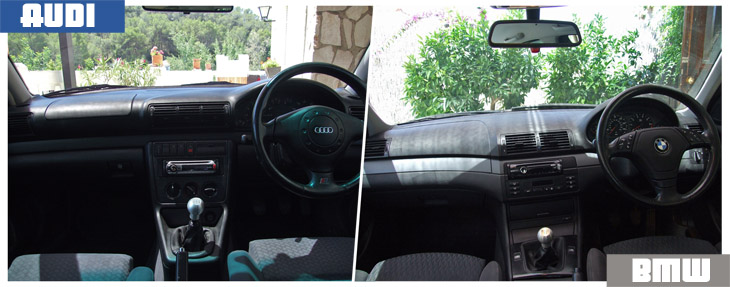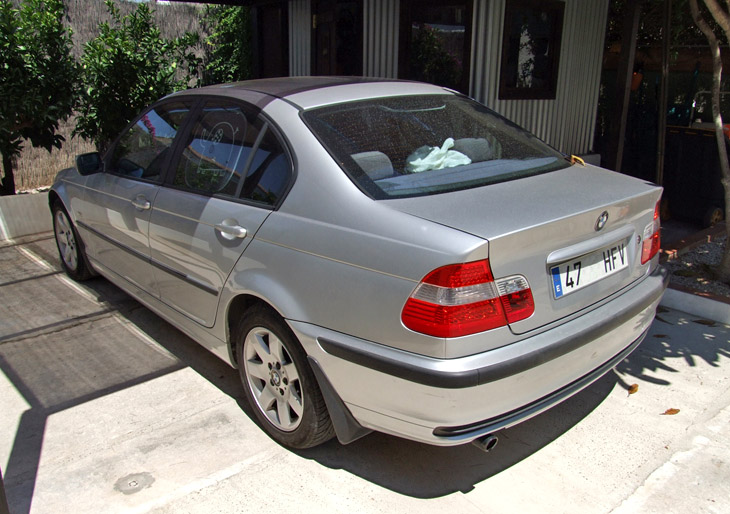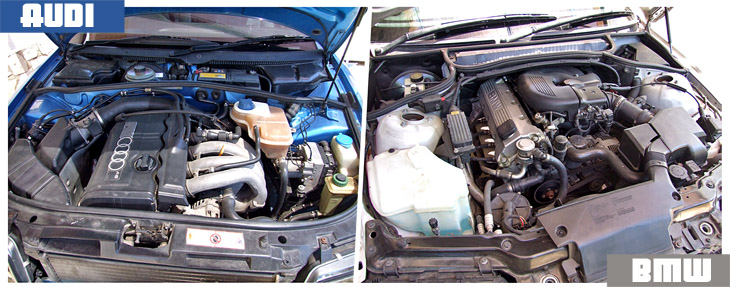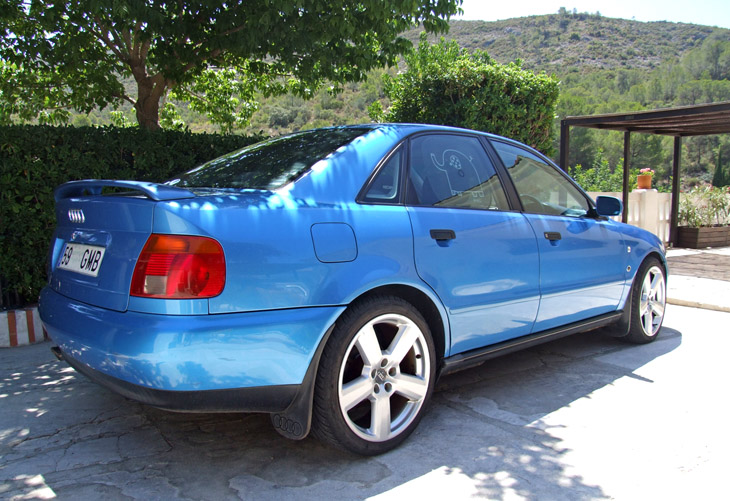BMW
3-Series (E46) vs Audi A4 (B5) Buyer's Guide
Okay, so having owned both of these cars for several years I feel
I'm in a pretty good position to provide a long-term review and comparison
of these two rivals.
Firstly, here's a bit of background on the cars and their previous
history - it's only fair in the interests of impartiality.
The Audi is a 1996 1.8 non-turbo (125 hp). It had six previous owners
when I bought it as affordable but practical runabout. It had 72,000
miles on the clock - now it has 113,000. Its been my reliable steed
for nearly 8 years and only failed to start once. It was fixed the
same day for less than the price of a couple of packs of imported
beer. Clearly it's not completely standard. It has Audi 18-inch wheels
and a mild lowering kit. Other than that it's fairly clean for its
age, and was painted in the stunning and desirable special order Kingfisher
blue.
The BMW is a slightly more recent purchase. It's been in my possession
for about 3 years, and has covered 94,000 miles - up from 84,000 when
it was purchased. Like the Audi it's one of the lower-powered models
- a 318i with the 1.9 litre engine. As it's an early 1999 3-Series
model it has the less-powerful M43 engine producing around 118 horsepower
- later the 318 was fitted with a 140 hp engine.
Both cars were originally registered in the UK but imported at a later
date to Spain. Both cars have aftermarket headlights in order to comply
with regulations regarding RHD cars imported into LHD countries.
Interior

When it comes to the interior design, both cars offer similar features
and a similar level of quality. Although as usual the Audi just has
the edge when it comes to overall quality. The Audi was fitted from
the factory with some S-Line bits which most noticeably include the
3-spoke sports steering wheel. The standard steering wheel of the
A4 B5 is a far less appealing 4-spoke unit. The Audi's wheel is a
little chunkier than the BMW's - which feels like it has a thin rim
in comparison. The dash layout and gear stick position on the BMW
is more driver focused than the Audi. Also I find the center armrest
of the BMW particularly comfortable, and it might sound silly, but
I always miss it when scooting around in the A4 (you can buy aftermarket
ones). The instrument cluster on the Audi is also a little clearer
than the BMW's display, and there are also a couple more gauges instead
of the idiot lights on the BMW. Comfort-wise the seats are fairly
similar - the Audi has optional lumber support, but it's not really
a major improvement. The rear seat passengers in the 3-Series definitely
have a smidgen more legroom than in the Audi, and they also find it
more comfortable - or so I've been told! The cargo space is fairly
similar on both, however the Audi's seems a little deeper and the
opening is fractionally larger. After a couple of years of putting
a baby stroller in and out of both cars I've got a good feel for the
difference - even if it is very small.
Exterior

With both cars being German saloons - or sedans if you prefer - they
are fairly similar in proportion and dimensions. Again overall quality
and fit and finish on both cars is pretty good. There's a good solid
'thunk' when closing the doors on both cars, and most body panels
can be removed with similar levels of ease or difficulty. One minor
plus the BMW has over the Audi are the far more secure jacking points
when using the standard-fitment scissor jack. Both cars carry a full
size spare in the back underneath the floor of the cargo compartment.
In terms of holding up to corrosion, both cars seem to be equally
adept at keeping any rust at bay.
Transmission
Here's where things start to divide the cars. Of course the BMW is
RWD, while in this case the Audi is FWD. The Audi was also sold in
AWD versions, but I can't really comment on how that matches up to
the RWD of the BMW. Personally I much prefer the feel of RWD to FWD,
and in the warmer climate of Spain it's extremely rare that the roads
are slippery enough that RWD becomes a liability - meaning it can
be used safely all year round. Both cars are equipped with 5-speed
manual transmissions, and the BMW's certainly slots in with a bit
more of a quality feel. Without a doubt the BMW has the edge in this
department. The BMW also comes as standard with a traction control
button, whereas the Audi has none.
Handling
Again this is another area where the BMW wins hands down. Not just
for the superior feeling the RWD layout provides, but for the way
it turns in, and the feedback through the steering wheel. Neither
of these cars left the factory with the intention of being flung round
the track - perhaps their more highly-powered siblings yes, but a
318i and a non-turbo 1.8 A4 were just run-of-the-mill family cars.
But that being said, despite its mundane engine, the BMW is, for a
15-year old family car, still engaging on twisty roads. The downside
to the BMW is its rather poorly engineered front suspension setup
which is prone to premature wear and early failure. Mine has already
had some work done in this area, and is in need of some more in the
near future. Meyle provide upgraded aftermarket components for many
of these weaker parts and are considerably better engineered than
the standard BMW components while also being considerably cheaper.
BMW have also designed the suspension system so that some of the ball
joints cannot be replaced separately, the whole arm must be replaced.
On the other hand, while the Audi might not handle as well - it has
a tendency to feel a bit front heavy - the parts seem to have a longer
life and be considerably cheaper.
Engine

In this case the Audi has the edge. The 20 valve 1.8 litre engine
- essentially the same block used in the extremely popular and highly
customizable 1.8 litre turbo charged engine - is very good in general
with few weak spots. The cambelt is the thing to watch in regards
to this unit, with most people recommending a change every 60,000
miles - or less. I had mine done about a month after I bought the
car because I couldn't find any receipts proving it had already been
done. If the cambelt goes, then you can kiss good-bye to the engine.
In my opinion, the Audi's engine also seems a little simpler and easier
to work on, and is also slightly more accessible in the engine bay
being positioned further forward in the chassis. The BMW's engine
on the other hand is a little more problematic, with a known tendency
for cooling issues - check out some E46 forums and you'll see what
I mean. I too have suffered in that area, although thankfully it wasn't
too expensive to fix. In my case it was a leaking pipe at the back
of the engine - apparently a common fail point in the cooling system.
The coolant expansion tank is another weak spot in the BMW engine.
Look out for warped heads too from engines which have overheated -
a leaky head gasket is a good indicator of this.
Reliability
In my particular case the Audi wins in terms of reliability. Of the
two cars compared here, the Audi has considerably higher mileage and
is several years older, yet at the same time it's had less issues
over the years and been cheaper to fix when things have gone wrong.
Much of that could be down to the fact it shares a number of components
with the VW Passat as well as several other Audi models. Or it could
just be luck that nothing expensive has given out! However after perusing
owners forums for both cars many times over the years to diagnose
issues on both cars, it seems that in my case at least, the BMW has
suffered from several of the most common complaints, while the Audi
has only had one or two.
Styling

Styling is subjective, so what one person likes another might dislike.
There's not too much to dislike about the 3-Series' or A4's styling
in general. Many people would say the BMW is the more handsome of
the two cars, but that's not to say the Audi isn't a good looking
vehicle. The Audi has a cleaner rear-end design than the BMW, however
the BMW probably looks a little more contemporary from the front.
If you want to get really picky, the Audi has prettier exterior mirrors.
In the end though, it's all personal taste.
Maintenance
The Audi is the cheaper car to service. Not by much, but it's definitely
noticeable when the jobs start to get bigger. In addition the BMW
has more irritating service lights - which can sometimes be a bit
over sensitive. Case in point; it recently had a front brake pad change,
not because the brakes were soft or starting to make a noise, but
because the brake pad wear light had come on and it was the only way
to get it to stay off. Both cars have a very healthy fanbase, with
plenty of helpful forums and lots of aftermarket options available.
Conclusion
Both cars have their upsides and downsides. The Audi A4 (B5) wins
for interior quality, the 1.8 litre engine, reliability and servicing
costs. While the BMW takes the win in terms of handling, transmission
(RWD was always going to win over FWD), and exterior styling.
Overall the BMW is definitely the more enjoyable car to drive, the
chassis is great and the handling - for what is basically a cheap
second-hand family car - is superb. On the downside E46 3-Series drivers
often have a bad reputation amongst other motorists. But whether that's
deserved or not, if you discount it just because of what other people
think you're potentially missing out on a very good car which can
be bought for peanuts.
Another nod to the BMW comes from my highly impartial wife. Who, when
informed of my decision to do a comparison between our two daily drivers,
said: "That's easy. The BMW is better".
All-in-all however, it all boils down to what your requirements are.
If you appreciate a fine handling car then definitely consider the
3-Series. If you value reliability, build quality and more affordable
parts, have a good look at the A4.
Resources and Further Reading:
Audi
A4 B5 forum (Audizine.com)
BMW 3-Series E46 forum (E46Fanatics.com)
Audi
A4 B5 history and development (Wikipedia)
BMW
3 Series E46 history and development (Wikipedia)
|

